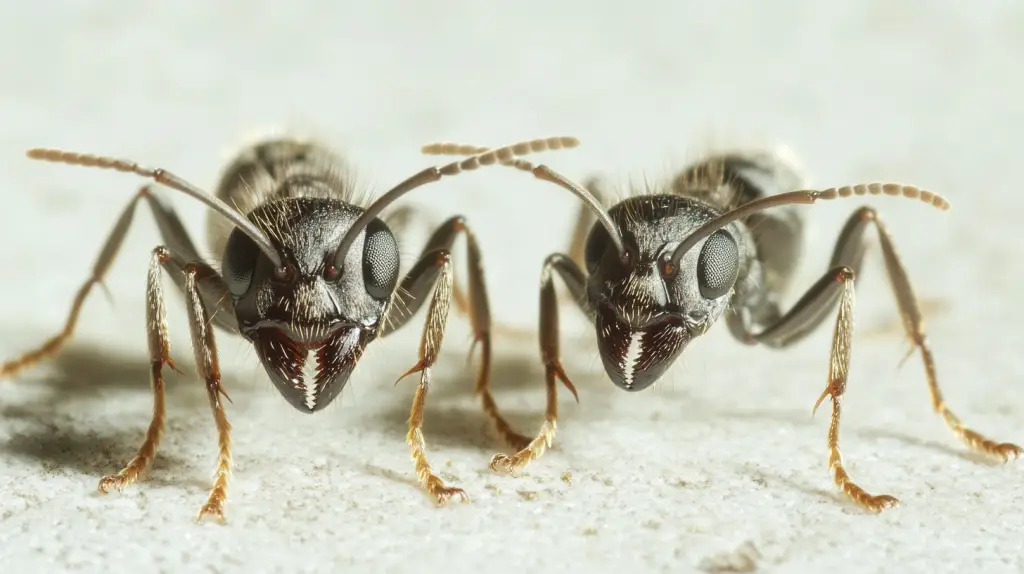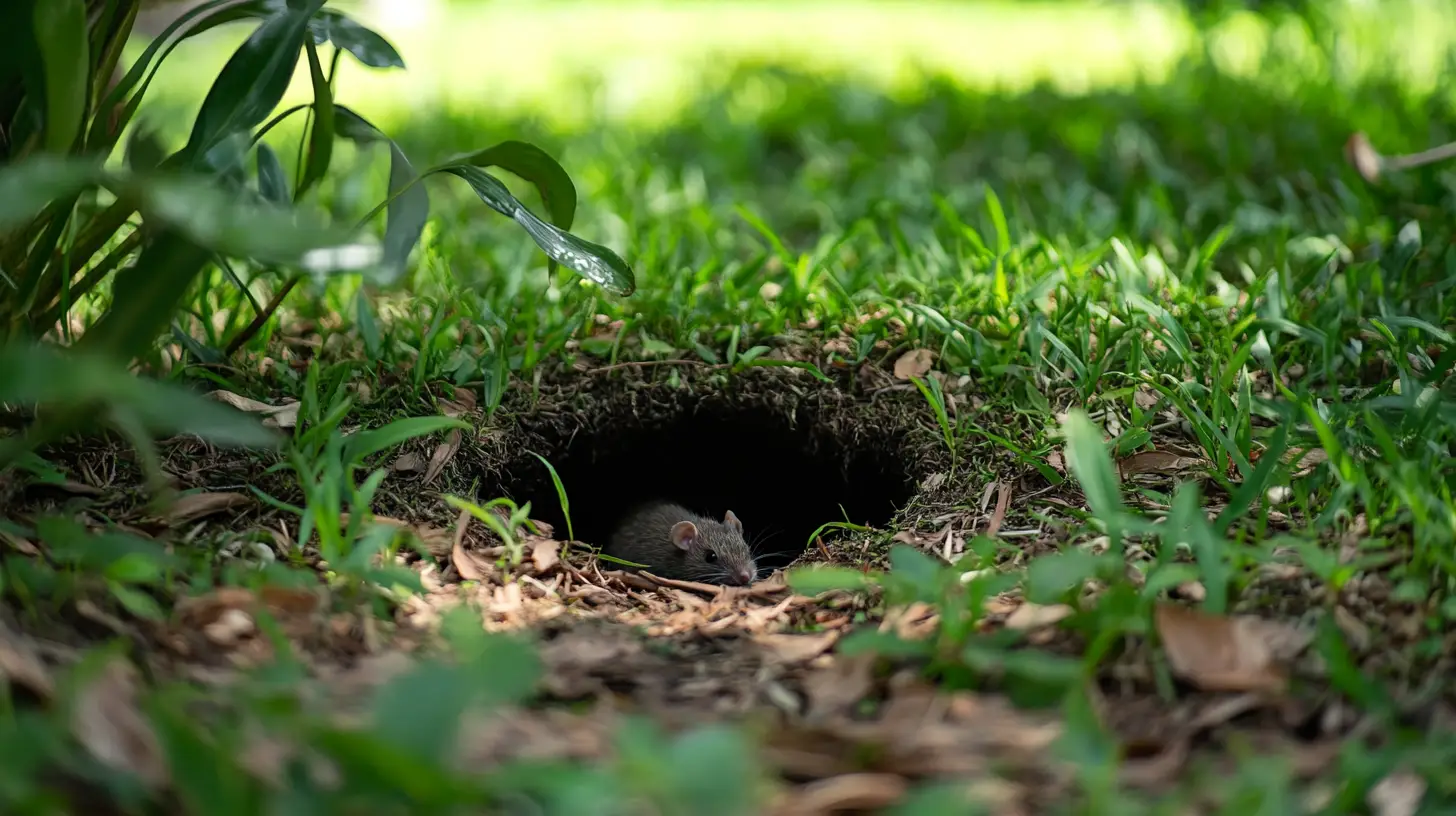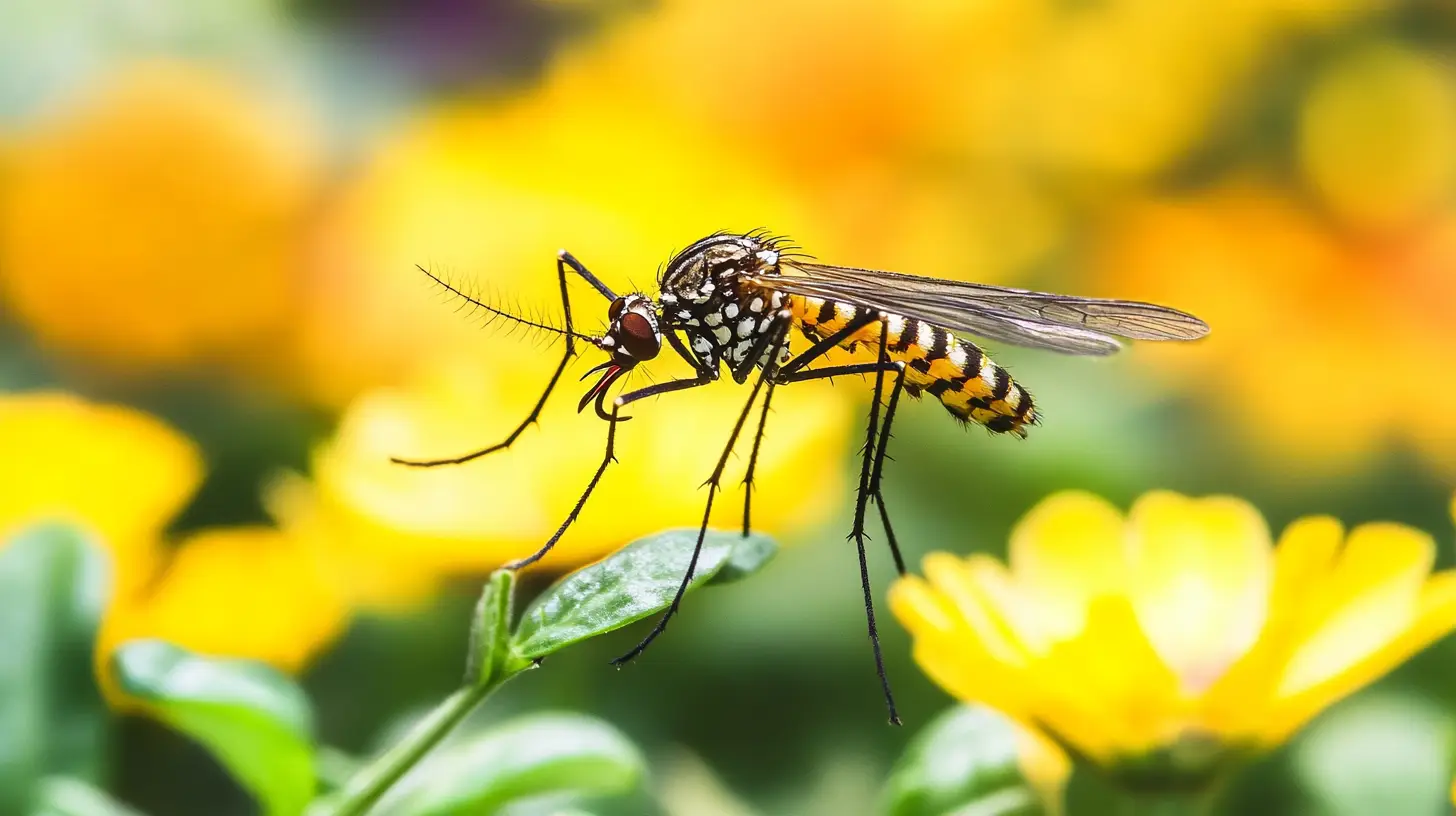
Table of Contents
If you’ve noticed small piles of dirt or sand along your driveway, patio, or sidewalk, you may be facing a pavement ant infestation. These tiny ants, measuring about 1/8 inch long, are some of the most common pests in Lakewood Ranch. Despite their size, they can form colonies of up to 10,000 workers, often nesting under pavement or foundations, making them tricky to get rid of pavement ants.
Pavement ants are not only resilient but also opportunistic feeders. They’re attracted to a variety of foods, including sweets, greasy substances, seeds, and even dead insects. Their colonies can have multiple queens, which allows them to expand quickly. Even though they aren’t aggressive toward humans, their persistence in entering homes through tiny cracks can be a real nuisance, especially around kitchens and pantries where food is available. In fact, once inside, pavement ants can be difficult to eradicate without professional help—making prevention key to keeping them at bay.
In this post, we’ll dive into the best strategies to get rid of pavement ants, offering expert insights specifically for Lakewood Ranch homeowners. You’ll learn how to identify their nests, manage potential food sources, and implement long-term solutions to keep these pesky invaders out of your home for good.
Key Takeaways
- Accurate Identification: Recognizing pavement ants involves noting their size, color, and unique physical traits such as spines and segmented antennas, crucial for effective control.
- Nesting and Behavior Patterns: Pavement ants prefer nesting in cracks found in pavements and driveways, and their diet includes sweets and greasy foods, making kitchens a common target.
- Proactive Preventative Measures: Sealing entry points, eliminating accessible food sources, and reducing moisture in your home can deter pavement ant infestations effectively.
- Effective Treatment Strategies: Utilize bait traps tailored to ants’ dietary preferences and apply insecticides directly to nests for comprehensive colony elimination.
- Environmental Considerations: Employ natural deterrents like cayenne pepper or vinegar to manage ants without harmful chemicals, promoting environmental health.
Pavement Ant Identification
When aiming to get rid of pavement ants, accurate identification is key. These small ants typically measure around 1/8 inch in length. In Lakewood Ranch, where pavement ants are common, you often see them as a mix of brown and black, with paler legs and antennae.
Recognizing these ants involves noting their physical traits, such as the pair of spines on their back, grooves on the head and thorax, and a 12-segmented antenna with a three-segmented club. Unique to females and males, reproductive forms possess wings and are significantly larger than workers.
Pavement ants have a distinct habitat and behavior that aids identification. In Lakewood Ranch, the ants nest in cracks and crevices found in pavements, sidewalks, and driveways. Indoors, they prefer cracks in basement walls or high-moisture areas like kitchens. Observing small mounds of soil near these sites can indicate their presence.
Signs of infestation appear in the form of noticeable trails. These trails are often seen on floors, in crevices, or near entry points. Given their preference for greasy and sweet foods, kitchen sightings are common, especially in areas with abundant food sources and moisture. Understanding these identification factors facilitates your approach to effectively manage and remove pavement ant infestations.
Pavement Ant Nesting Habits
Pavement ants often nest in the cracks and crevices of pavements, driveways, and sidewalks. Understanding these habits is crucial in effectively getting rid of pavement ants in Lakewood Ranch environments.
Insecticide Usage
Applying insecticide directly to the ant nests offers an effective way to control infestations. You can use slow-acting bait to ensure the entire colony is affected. Consider using gel baits, which are consumed by worker ants and carried back to the nest. Persistency in application can help eliminate these pests by disrupting their population dynamics.
Perimeter Spraying
Employing perimeter spraying targets potential entry points around your property. Focus on windows, doors, and foundation cracks where ants typically enter homes. Carry out this method regularly and monitor for signs of re-entry. Performing this task during early spring or late fall optimizes effectiveness against these ants’ seasonal movements.
Yard Spraying
Yard spraying aims to create a barrier preventing ants from nesting in your outdoor spaces. Target shaded and moist areas in your yard, which are ideal for ant nesting. For consistent results, ensure even coverage of your lawn and repeat after periods of heavy rain, as precipitation can wash away insecticides.
Pavement Ant Diet
Understanding the diet of pavement ants offers insights into effective control measures. These small insects prioritize food sources rich in sugar and protein. When you notice them in your Lakewood Ranch kitchen, it’s often because they’re drawn to commonplace pantry items like honey, nuts, cheese, and bread. Sweet treats like cookies, jam, and crackers can also become targets.
Pavement ants aren’t picky eaters, though. They’ll consume grease and pollen, making even the tiniest kitchen spills a potential attraction. If you have pets, their food might become part of the ants’ menu, contributing to pesky infestations. Outdoors, these ants feed on plant nectar and even dead insects, showing their opportunistic nature.
To leverage their dietary preferences in your search to get rid of pavement ants, consider using targeted bait traps. These baits simulate the ants’ favorite foods—offering sugary, fat-based, or protein-rich options. The worker ants bring the bait back to the colony. This strategy can be particularly effective in eliminating the colony, including the queen, so breaking the cycle of infestation.
Pavement Ant Behavior and Distribution
Pavement ants in Lakewood Ranch exhibit exact behavior and distribution patterns that influence how you can manage and get rid of pavement ants effectively. Understanding these behaviors is key to controlling their presence in homes and outdoor spaces.
- Nesting Habits: Pavement ants get their name because they commonly nest under pavement, such as sidewalks, driveways, and building foundations. They prefer minimal vegetation and establish nests in soil under these surfaces.
- Foraging and Food Preferences: These ants have a diverse diet, feeding on both sweet and protein-rich sources. They’re attracted to kitchens or outdoor dining areas, where they can find honeydew, fruits, grease, meats, and pet food. You’ll often see workers forming trails to access these food sources, both indoors and outdoors. Understanding these preferences helps in placing targeted bait traps effectively.
- Swarming and Reproduction: During late spring and early summer, pavement ants engage in swarming behavior. This swarming is part of their reproductive cycle and occurs when conditions are favorable, leading to potential infestations in new areas. Recognizing swarming periods aids in timing preventive measures to reduce the risk of new colonies establishing.
In Lakewood Ranch, pavement ants are a common household nuisance due to their adaptable nesting and foraging behavior. By identifying and understanding these patterns, you can take informed actions to reduce their impact effectively.
How to Get Rid of Pavement Ants
Effectively tackling pavement ant infestations, particularly in regions like Lakewood Ranch, requires a combination of identification, prevention, and treatment strategies. These small ants, seen trailing along sidewalks and nesting in pavements, pose not just a nuisance but also a potential threat to structural integrity.
Identification and Understanding
Recognizing pavement ants is your first step. Typically measuring about ⅛ of an inch, these pests are black or brown with defining features like spines on their back and grooves across their thorax. Knowing their tendency to inhabit high-moisture areas can help in early detection. You’ll often find them foraging indoors during winter or after colonies expand during their summer swarms.
Preventative Measures
Taking proactive steps can help keep your home free from these ants:
- Seal Entry Points: Inspect your home for any cracks in basement walls, concrete floors, or around window frames. Fill these with appropriate sealants to stop ant entry.
- Eliminate Food Sources: Store food in airtight containers and routinely clean counters and floors. Ants are drawn to sugary and greasy foods, so removing even small crumbs can deter their interest.
- Reduce Moisture: Fix water leaks, use dehumidifiers, and ensure proper ventilation in moisture-prone areas like kitchens and basements. A dry environment is less appealing to pavement ants.
Treatment Methods
Combating an existing infestation requires targeted efforts:
- Baiting: Effective baits mimic the ants’ dietary preferences, such as sugars and proteins. Position baits along ant trails to ensure workers carry the poison back to the colony.
- Insecticides: Apply insecticides directly to visible nests or along suspected entry points. Perimeter spraying around your home’s exterior can reduce the likelihood of ants entering.
- Natural Remedies: Employ environmentally friendly options, like diatomaceous earth or vinegar-water answers, both of which can deter ants without harmful chemicals.
Regular monitoring and a proactive approach can help you manage pavement ants effectively. Adopting these methods not only protects your property but also aligns with environmentally conscious practices, ensuring a safe habitat for both humans and beneficial organisms.
Get Rid Of Pavement Ants
Effective use of ant baits supports your efforts to get rid of pavement ants. These baits attract worker ants, who then transport the poison back to their colony.
Why Ant Bait?
Ant bait effectively eliminates entire colonies, not just visible ants. Worker ants attracted to the bait transport it back to share with the colony. This results in eliminating the queen and the future population. Sweet baits attract ants with a preference for sugary foods like honey. Meanwhile, the combination of borax with syrup provides a homemade alternative. Commercial baits, such as those using methoprene, are effective and low in toxicity. Though slower to show results, baits offer long-term answers by targeting the queen.
Combination Kits (Contain Both Protein-Base and Sweet-Base Baits)
Combination kits contain both protein and sweet-based baits, ensuring effectiveness for different feeding cycles. Pavement ants, attracted by a variety of food sources, respond well to these dual-action kits. For instance, while sweet baits target sugary food seekers, protein-based baits contain substances like meat grease. This variation attracts grease-feeding pavement ants. Implementing such kits helps capture the diverse diet of ants, ensuring comprehensive colony disbandment.
Consider employing these strategies to disband pavement ant colonies effectively. Using recommended baits provides a targeted approach to addressing infestations that match the exact ant behaviors in Lakewood Ranch.
How To Prevent Pavement Ants
To prevent pavement ants, maintain vigilance in scanning for nests and entry points. In Lakewood Ranch, these ants often establish homes in sidewalk and driveway cracks. Observing their movement, particularly at night when they’re most active, can reveal potential access paths that need sealing.
Secure your surroundings by addressing potential food sources. Given these ants’ penchant for sugary and protein-rich foods, regularly sweep floors, wipe counters, and store edibles in sealed containers. Making your kitchen unappealing to these opportunistic feeders reduces infestations.
Sealing cracks and crevices in foundations discourages entry. Consider using caulk or sealant for these openings and around ant trails. Pavement ants are tiny, so thorough sealing prevents their access.
For eco-friendly deterrence, scatter natural substances like cayenne pepper or lemon peels along your home’s perimeter. Their scent can disrupt ant communication and act as a preventive boundary against these persistent pests.
By integrating these strategies, you can maintain a comfortable and ant-free home in Lakewood Ranch, contributing to the balance between human habitation and the surrounding environment.
Frequently Asked Questions (FAQs)
What attracts pavement ants to homes?
Pavement ants are primarily attracted to food sources in homes, especially sweet and protein-rich substances like honey, nuts, and greasy foods. Kitchens are common hotspots for these ants due to spills and uncovered foods. They also seek shelter during cooler months, nesting in cracks and high-moisture areas such as kitchens and bathrooms.
How can I identify pavement ants in my home?
Pavement ants measure about 1/8 inch in length and have a mix of brown and black coloring. Key identification traits include spines on their back and grooves on their head and thorax. They often follow noticeable trails on floors, particularly near entry points and food-rich environments.
What are effective ways to prevent pavement ant infestations?
To prevent pavement ant infestations, seal entry points such as cracks in sidewalks and driveways. Keep kitchens clean, store food in sealed containers, and eliminate moisture buildup. Regularly inspect your property for signs of nesting and use natural deterrents like lemon peels or cayenne pepper to disrupt communication.
How do ant baits work against pavement ants?
Ant baits attract worker ants that transport the bait back to their colony. The bait, often mimicking the ants’ preferred foods, eventually affects the entire colony, including the queen, thus eliminating the infestation over time. Combination kits with sweet and protein-based baits are especially effective.
What should I do if I spot pavement ant trails?
If you notice ant trails, focus on identifying their entry points. Use bait traps along these paths and seal any cracks or crevices they might be using. Cleaning the surrounding areas can help reduce attractive food sources, discouraging further ant activity in your home. Regular monitoring is crucial for effective management.









